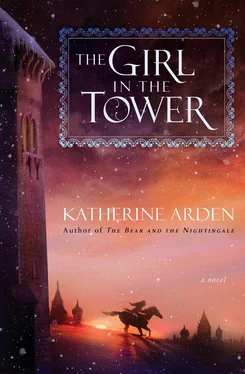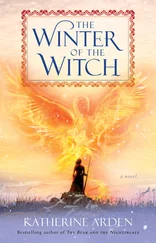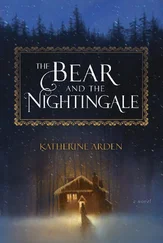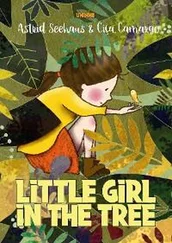He seemed to hesitate, just an instant. “Think of me sometimes,” he returned. “When the snowdrops have bloomed and the snow has melted.”
“Is that all?” she asked, and then added, with wry honesty, “How could I forget?”
“It is easier than you would think. Also—” He reached out.
Startled, Vasya kept perfectly still, though her traitorous blood rushed out to her skin when his hand brushed her collarbone. A silver-backed sapphire hung round her neck; Morozko hooked a finger beneath its chain and drew it forth. This jewel had been a gift from her father, given to her by her nurse before she died. Of all Vasya’s possessions, the sapphire was her most prized.
Morozko held the jewel up between them. It threw pale icicle-light across his fingers. “You will promise me,” he said, “to wear this always, no matter the circumstances.” He let the necklace fall.
The brush of his hand seemed to linger, raw on her skin. Vasya ignored it angrily. He was not real, after all. He was alone, unknowable, a creature of black wood and pale sky. What had he said?
“Why?” she asked. “My nurse gave it me. A gift from my father.”
“It is a talisman, that thing,” Morozko said. He spoke as though he were choosing his words. “It may be some protection.”
“Protection from what?” she asked. “And why do you care?”
“Contrary to what you believe, I do not want to come for you, dead in some hollow,” he returned coldly. A breeze, soft and bone-chilling, filtered through the room. “Will you deny me this?”
“No,” said Vasya. “I meant to wear it anyway.” She bit her lip and turned away a little too quickly to untie the flap of the first saddlebag.
It held clothing: a wolfskin cloak, a leather hood, a rabbit-fur cap, felt-and-fur boots, trousers lined with fleece. The other held food: dried fish and bread baked hard, a skin of honey-wine, a knife, and a pot for water. Everything she would need for hard travel in a cold country. Vasya stared down at these things with a delight she had never felt for the gold or gems of her dowry. These things were freedom; Vasilisa Petrovna, Pyotr’s highborn daughter, would never have owned such things. They belonged to someone else, someone more capable and more strange. She looked up at Morozko, face alight. Perhaps he understood her better than she’d thought.
“Thank you,” Vasya said. “I—thank you.”
He inclined his head but did not speak.
She didn’t care. With the skins came a saddle of no kind that she had ever seen before, little more than a padded cloth. Vasya leaped up eagerly, already calling to Solovey, the saddle in one hand.
* * *
BUT SADDLING THE HORSE was not so easy. Solovey had never worn a saddle—even this skin that passed for one—and did not like it much.
“You need it!” Vasya finally burst out, exasperated, after a good deal of fruitless sidling about the fir-grove. So much for the brave and self-sufficient wanderer, she thought. Solovey was no nearer to being saddled than when they began. Morozko was watching from the doorway. His amused glance bored into her back.
“What will happen if we are going all day for weeks on end?” Vasya demanded of Solovey. “We’ll both be chafed raw, and besides, how will we hang the saddlebags? There is grain for you in there, too. Do you want to live on pine-needles?”
Solovey snorted and shot a covert glance at the saddlebags.
“Fine,” Vasya said through gritted teeth. “You can just go back to wherever you came from, and I’ll walk .” She started toward the house.
Solovey lunged and blocked her way.
Vasya gave him a glare and a shove, which had precisely no effect on the great oak-colored bulk. She crossed her arms and scowled. “Well, then,” she said, “what do you suggest?”
Solovey looked at her, then the saddlebags. His head drooped. Oh, very well, he said, without much grace.
Vasya carefully did not look at Morozko as she finished making ready.
* * *
SHE LEFT THAT SAME MORNING, under a sun that burned away the mist and set diamonds in the fresh-fallen snow. The world outside the fir-grove seemed large and formless, faintly menacing. “I don’t feel like a traveler now,” Vasya admitted, low, to Morozko. They stood together outside the fir-grove. Solovey waited, neatly saddled, with an expression caught between eagerness and irritation, disliking the saddlebags on his back.
“Neither do travelers, often enough,” the frost-demon returned. Unexpectedly, he put both hands on her fur-clad shoulders. Their eyes met. “Stay in the forest. That is safest. Avoid the dwellings of men, and keep your fires small. If you speak to anyone, say you are a boy. The world is not kind to girls alone.”
Vasya nodded. Words trembled on her lips. She could not read his expression.
He sighed. “May you have joy in your wanderings. Now go, Vasya.”
He boosted her into the saddle, and then she was looking down at him. Suddenly he seemed less a man than a man-shaped confluence of shadows. There was something in his face she did not understand.
She opened her mouth to speak again.
“Go!” he said, and slapped Solovey’s quarters. The horse snorted and spun and they were away over the snow.
Thus Vasilisa Petrovna, murderer, savior, lost child, rode away from the house in the fir-grove. The first day ran on as an adventure might, with home behind and the whole world before them. As the hours passed, Vasya’s mood went from apprehensive to giddy, and she pushed the sour remains of loss and confusion to the back of her mind. No distance could stand before Solovey’s steady stride. Before half a day was gone, she was further from home than she’d ever been: every hollow and elm and snowy stump new to her. Vasya rode, and when she grew cold, she walked, while Solovey jogged with impatience.
So the day wore on, until the winter sun tilted west.
Just at dusk, they came upon a great spruce, with snow mounded up all around its trunk. By then, the twilight had blued the snow and it was bitterly cold.
“Here?” Vasya said, sliding down from the horse’s back. Her nose and fingers ached. Standing upright, she realized how stiff she was, and how weary.
The horse twitched his ears and raised his head. It smells safe .
A childhood running wild in a country with a seven-month winter had taught Vasya how to keep herself alive in the forest. But her heart failed a little, suddenly, at the thought of this freezing night all alone and the next and the next. She blew her nose. You chose this, she reminded herself. You are a traveler now .
The shadows draped the forest like hands; the light was all blue-violet and nothing looked quite real. “We’ll stay here,” Vasya said, pulling off Solovey’s saddle, with more confidence than she felt. “I am going to make a fire. Make sure nothing comes to eat us.”
Laboring, she dug the snow away from the tree, until she had a snow-cave under the spruce-branches and a patch of bare dirt for her fire. The winter twilight ran swiftly to night, in the way of the north, and it was full dark before she had chopped enough firewood. In the starlit dark, before moonrise, she also cut fringed limbs off the spruce as her brother once showed her, and planted them in the snow, to reflect heat toward her shelter.
She had been making fires since her hands could grip the flints, but she had to take her mittens off to do it, and her hands grew very cold.
The tinder caught at last; the flames roared up. When she crawled into her new-dug shelter, she found it cold, but bearable. Water boiled with pine needles warmed her; black bread toasted with hard cheese eased her hunger. She burned her fingers, and charred her dinner, but it was done at last, and she was proud.
Читать дальше












